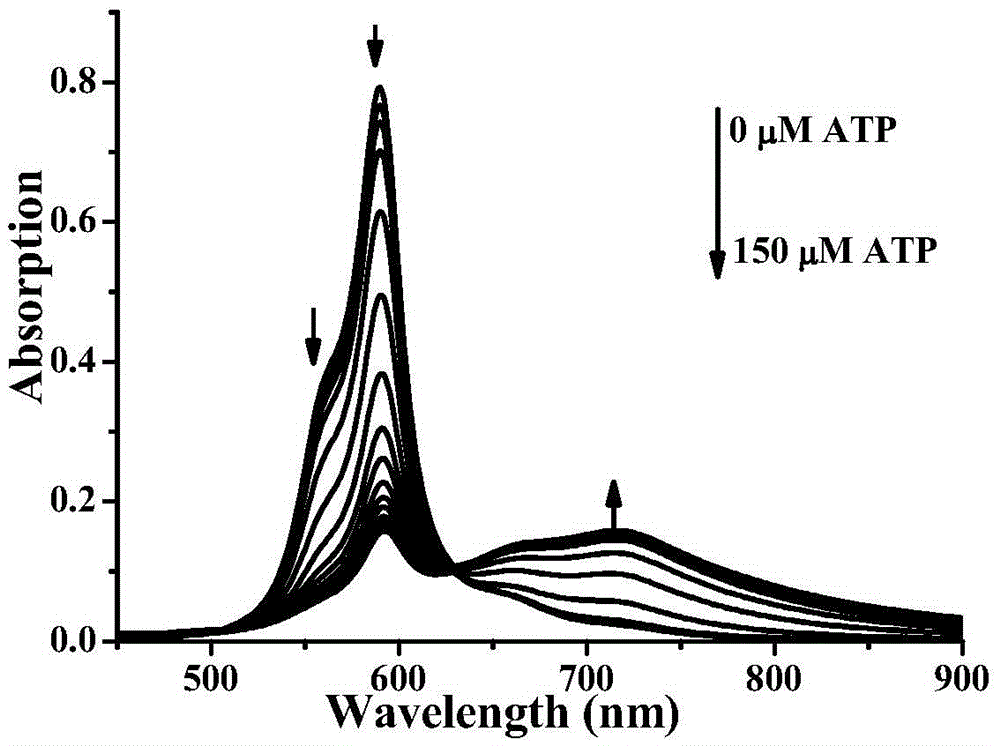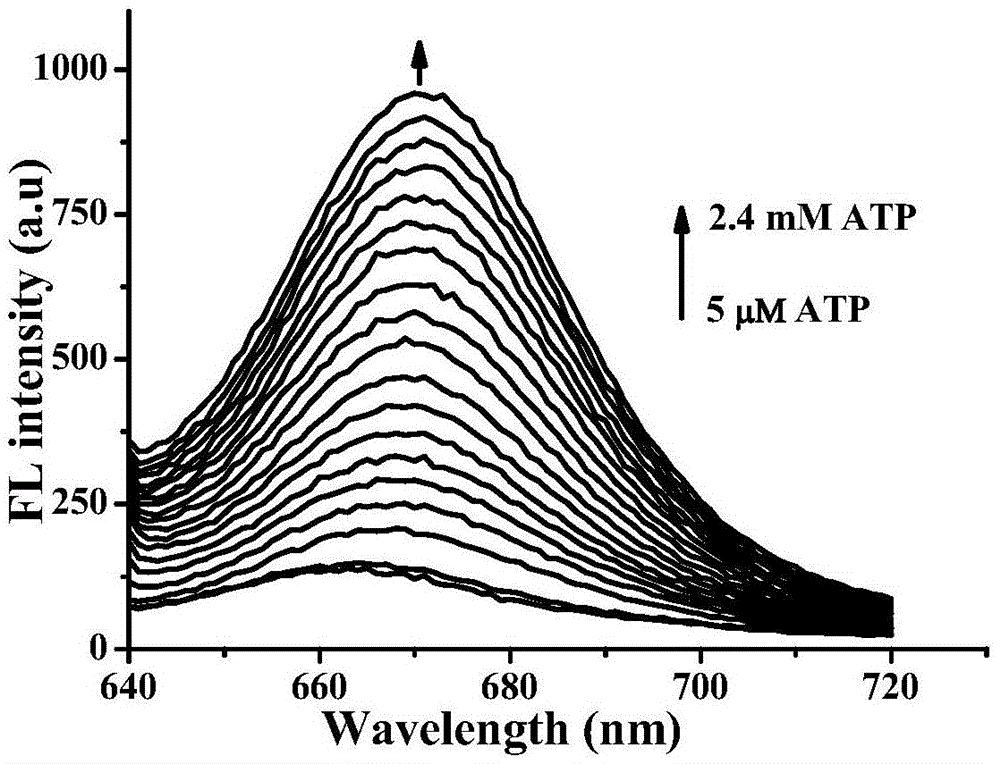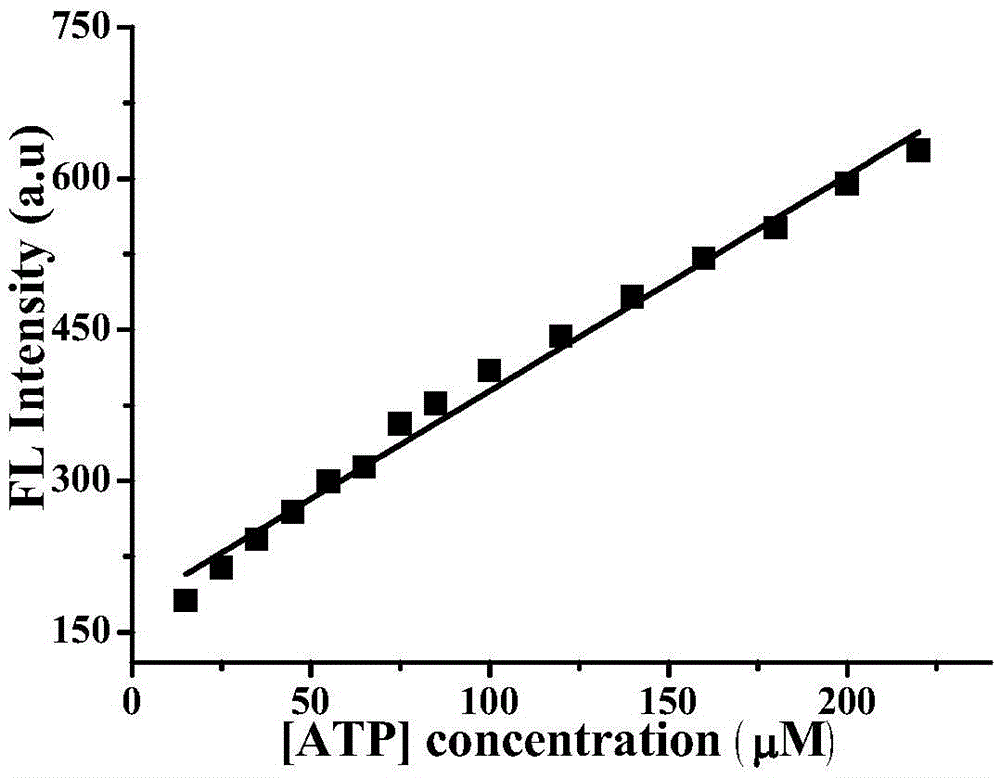Preparation method of ATP (adenosine triphosphate) near infrared fluorescent probe
A technology of adenosine triphosphate and fluorescent probes, applied in the field of small molecule fluorescent probes, can solve the problems of decreased fluorescence intensity, low sensitivity of probes, and sensitivity to scattered light, etc., to reduce external interference, fast and convenient analysis, and simple synthesis steps Effect
- Summary
- Abstract
- Description
- Claims
- Application Information
AI Technical Summary
Problems solved by technology
Method used
Image
Examples
preparation example Construction
[0029] Referring to accompanying drawing, the present invention is the preparation method of adenosine triphosphate near-infrared fluorescent probe, and its steps are:
[0030] S1, dissolving squaraine dye in an organic solution to obtain an organic solution of squaraine;
[0031] S2. Dissolving N,N-bis(2-aminoethyl)-1,2-ethylenediamine in an organic solution to obtain N,N-bis(2-aminoethyl)-1,2-ethylenediamine organic solution;
[0032] S3. Add the squaraine organic solution dropwise to the N,N-bis(2-aminoethyl)-1,2-ethylenediamine organic solution, stir at room temperature for 2 hours, then remove the organic solution, pass through the column Chromatographic separation and purification to obtain adenosine triphosphate near-infrared fluorescent probe.
[0033] The organic solution includes dichloromethane solution, especially anhydrous dichloromethane.
[0034] The concentration of the squaraine organic solution was 4.19 mM.
[0035] The concentration of the N,N-bis(2-amin...
Embodiment 1
[0043] Example 1: Adenosine triphosphate near-infrared fluorescent probe.
[0044] This embodiment includes the following steps:
[0045] S1. Dissolving 250 mg of squaraine dye in 100 mL of anhydrous dichloromethane to obtain an organic squaraine solution;
[0046] S2. Dissolve 360 μL of N,N-bis(2-aminoethyl)-1,2-ethylenediamine in anhydrous dichloromethane to obtain N,N-bis(2-aminoethyl)-1, 2-Ethylenediamine organic solution;
[0047] S3. Add the squaraine organic solution dropwise to the N,N-bis(2-aminoethyl)-1,2-ethylenediamine organic solution, stir vigorously at room temperature for 2 hours, and then remove the anhydrous dichloro methane, the crude product of the near-infrared dye was obtained, and then separated and purified by column chromatography to obtain a blue-purple solid powder-like adenosine triphosphate near-infrared fluorescent probe.
[0048] The molecular structure of the obtained ATP near-infrared fluorescent probe is as follows:
[0049]
[0050] ...
PUM
 Login to View More
Login to View More Abstract
Description
Claims
Application Information
 Login to View More
Login to View More - R&D
- Intellectual Property
- Life Sciences
- Materials
- Tech Scout
- Unparalleled Data Quality
- Higher Quality Content
- 60% Fewer Hallucinations
Browse by: Latest US Patents, China's latest patents, Technical Efficacy Thesaurus, Application Domain, Technology Topic, Popular Technical Reports.
© 2025 PatSnap. All rights reserved.Legal|Privacy policy|Modern Slavery Act Transparency Statement|Sitemap|About US| Contact US: help@patsnap.com



